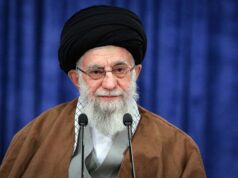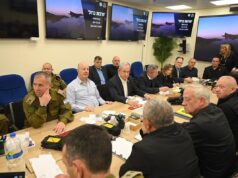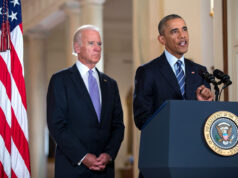The Bush administration decision to designate Iran’s Revolutionary Guards Corps (IRGC) as an “global terrorist” organization could have a chilling impact on the willingness of Western companies to do business with Iran, U.S. officials and Iran analysts told Newsmax.
The designation will be made pursuant to Executive Order 13224, which President Bush signed just two weeks after the September 11 attacks to shut down terrorist front companies operating in the United States.
“The immediate financial impact of designating the Revolutionary Guards under this executive order will be little or nothing, because it’s highly doubtful that the IRGC has any money in the United States or in dollars around the world,” former Treasury Department analyst Jonathan Schanzer tells Newsmax.
But the political impact “could be widespread,” he added.
“By designating the IRGC we are sending a message to the world that we are looking at an arm of the Iranian government and saying it is a terrorist entity. That is significant,” the former U.S. government analyst said.
The September 2001 Executive Order targeted Islamic charities and front companies that were raising money for Hamas, Hezbollah, or al Qaeda.
Schanzer, who worked on terrorist entity designations before he left Treasury late last year, believes the administration is “laying a foundation” for a full scale assault on Iran’s ability to acquire capital and technology from the West, that conceivably could lead to the designation of foreign oil companies as terrorist entities.
“The goal of this type of step is to scare off the foreign oil companies, send them a clear signal that they have to get out now, jump immediately, pull their funds out,” he said.
U.S. officials were not commenting officially on the proposed designation on Wednesday, as the details were still being finalized. However, sources tell Newsmax that the move came as a result of a growing frustration within the administration with the lack of effectiveness of the United Nations sanctions on Iran.
“Time is short,” one source said.
The administration is also counting on the fear factor. By designating the Revolutionary Guards in its entirety, the administration is hoping to make foreign companies doing business with Revolutionary Guards companies think twice about the wisdom of continuing that relationship.
“How much risk are they willing to accept? Are they willing to wake up one morning and find that their U.S. bank accounts have been frozen? Or their U.S. subsidiaries shut down? We want them to be forced to make a choice between doing business with the IRGC, and doing business with the rest of the world,” an administration source said.
Over the past three years, the IRGC has moved from being a purely military organization, parallel to the regular armed forces, to being a military-economic cartel, similar to the People’s Liberation Army in Communist China.
In 2004, when the Iranian government awarded the management of Tehran’s new airport to a Turkish company, the IRGC showed its clout by occupying the airport and preventing it from opening, until the contract was cancelled and given to one of its own companies.
Since former Revolutionary Guards officer Mahmoud Ahmadinejad took power in August 2005, the business activities of the IRGC have expanded dramatically.
The best known IRGC company, Khatam-ol-Anbia, is not a company in the Western sense but an entire branch of the Revolutionary Guards, employing an estimated 40,000 people, a former Iranian military officer told Newsmax.
“Khatam ol-Anbia handles billions of dollars of industrial, construction and oil projects in Iran and elsewhere,” he said. “They are involved in huge oil exploration projects in southern Iran, the Tehran metro, and have close ties to Chinese oil companies.”
In 2006, Khatam-ol-Anbia (which means “The Last Prophet,” a term used to designate the Prophet Mohammad) won a $2 billion no-compete contract from the Iranian government to develop parts of the South Pars natural gas field, and a separate $1.3 billion contract to build a pipeline.
Once Khatam-ol-Anbia (KOA) gets the business, it turns around and subcontracts to mostly foreign companies, said Dr. William Samii of the Center for Naval Analysis. “It doesn’t do much of it itself.”
In Feburary, for example, KOA officials publicly signed a $500 million contract with Dilam of South Korean to produce liquefied natural gas from the South Pars gas fields.
Oil industry giants such as Total of France and Petronas of Malaysia are also doing work on the South Pars project.
Ahmadinejad and IRGC leaders wanted KOA to get involved in oil and gas field development to break the back of the Iranian “oil mafia,” Dr. Samii told the American Enterprise Institute in May.
Iranian sources tell Newsmax that KOA was in charge of building the extensive network of tunnels and underground bunkers in southern Lebanon used by Hezbollah to hide the rocket launchers it used against Israel during last summer’s war.
“Khatam-ol-Anbia is sort of the Corps of Engineers of the IRGC,” Dr. Samii said.
“Who is the oil mafia? Hashemi Rafsanjani and his associates, by implication,” he added.
Khatam-ol-Anbia also built underground tunnel complexes and uranium enrichment plants in Natanz and Isfahan, Iranian sources told Newsmax.
“Our objective is that nobody should be doing business with them,” an administration official said.
“We will take a very serious look at any business anywhere in the world that is doing business with the IRGC and force them to make a choice. We’re going to make it as hard as possible for them to continue doing business with the IRGC.”
© NewsMax 2007. All rights reserved.





